#old sumerian religion
Explore tagged Tumblr posts
Text
The Christian mind-control Religion despises the feminine - thats why they have "The father (masculine), the son (masculine) and the holy spirit (genderless). That is part of their destructive doctrine. They always feared, hated and suppressed the divine feminine, which is the creative/creating power.
Christianity is actually based on the worship of sumerian/mesopotamian "gods" which were rulers made of flesh and blood. More info: The Eridu Conspiracy | What the Church Doesn't Want You to Know // The Anunnaki Creation Story: The Biggest Secret in Human History // Understanding Anunnaki History, the Return of Enki
#religion#critical thinking#the original cult/religion for all religions were the anunnaki rulers#the gods of the original/old testament are psychopathic and blood thirsty#the father#the son#the holy spirit#mysogyny#sexism#Suppression#mesopotamian gods#mesopotamian worship#sumerian#gods#sumerian clay tablets#christianity#truth seekers#theology
1 note
·
View note
Text
In an unmarked laboratory in North Eastern Kansas.
Breathing heavily, Cass stood up and took a look at her handy work, swiping copper curls away from her eyes. It had taken some effort, creativity, and lots and lots of cursing, but the room was finally finished. Mere months ago it had been a vague image of a dream of an idea, but now it was finally complete. Her friends and colleagues all laughed at her. Her parents had even gone back on their word to fund her Graduate School, telling her they had agreed to fund her schooling for a career, not a dead end obsession. But look at her now! In a laboratory! With real equipment! And funding! It didn't matter that she'd never heard of the government department those two bozos in their ridiculous white monkey suits claimed to be from, they'd handed her a functionally bottomless grant, all the equipment and time she needed, and told her only one thing.
"Report everything to us. No matter how miniscule you think it is, no matter how insignificant. If your coffee tastes different after an experiment, report it." What a bunch of weirdos.
"Ha...haha...hahaha hahaha! Finally! Now that the room is finished, all I need to do is start the process!" Cass crowed gleefully, giddy with excitement and anticipation. She once again looked at her work. She had to admit...it looked like the room of a person suffering from unmedicated schizophrenia. In the center of the 15x15 room was a circle, about 4 feet in diameter, inside the circle were symbols, sigils, and diagrams from Alchemy to the Zodiac. Just outside that circle was a ring of solidified salt, pressed into an impression on the floor. Spreading out from that across the floor, up the walls, and even on the ceilings were words in every language from Aztec to Sumerian, and religious iconography from every religion from Christianity to Zunism.
Cass had spent years preparing for this. Using every cent, every favor, every resource and scrap of goodwill she could find in preparation for this. She was finally going to prove to everyone that she wasn't some obsessed lunatic. She was going to prove the existence of Higher Beings. And to do it, she was going to summon a demon. Now all she had to do was start the process.
It was easy. She stepped up to the center of the circle. The focal point of the entire array of binding spells, prays, and words of power she'd inscribed in every surface of the room save for this cirlce, the one clean spot. She pulled out a scalpel and sliced the inside of her forearm, letting the blood bead up, then drip down and pool on the floor. She'd never understood the idea of cutting your hand. You used those. This was much easier to take care of, and you still had the use of both hands. After a few moments of letting the blood collect, Cass wrapped her arm in a towel, pressing down to make the bleeding slow, and stepped back out of the salt circle.
She briefly left the room, going to the first aid kit she left just outside the door to see to the minor laceration. After all, she didn't want dripping blood to ruin her sigils and protection charms. Once the bleed stopped, she returned to the room, a notebook in hand. She opened the notebook and began to chant.
400 miles away, at the Kent's Farm...
A young man, not dissimilar to Clark Kent when he was younger, was helping Pa Kent fix up the old tractor while Ma Kent tended to the animals. It seemed the pair had figured out what was wrong with it, but it was in a particularly hard to reach place.
"Sounds like we're gonna need to pull the whole engine out to fix this." Pa Kent said, a bit of disappointment in his voice, "That's gonna be pricey. Might have to wait a while." He mumbled to himself, one hand rubbing his jaw, leaving a trail of oil along his face, "Gonna be tough getting the crop in without ol' Bessie."
"Naaaah, don't worry about a thing. I can patch her up well enough to get the harvest in, then we can take out the engine over the winter." Danny said, his hand turning opaque. He then slid his hand through the chassi of the tractor, "Hold on," He continued, his face suddenly turned similarly opaque, "Better see what I'm doing here." He said as he shoved his face into the chassi of the tractor as well, "Yup! We were right! Duct busted. I can patch it up nicely, should last until the harvest is brought in!" He called from inside the tractor.
Pa Kent shook his head and chuckled, "Even with everything Clark did, I don't think I'll ever get use to that. Go ahead and patch her up. Then we can head in for lunch before tackling the field." He said, giving Danny a pat on the back. Suddenly a bright green glow emenates from the inside of the tractor before Danny pulled his head and hand back out.
"Let it cool, and it should be good an' patched." He said proudly, soot and oil covering his entire face and one hand.
"You uh, got somethin' on your face, Danny."
"Oh? Where?"
"Uh. there." Pa Kent said, pointing to the entirety of Danny's face before tossing him a rag, and turning to head into the house. Danny began to wipe his face off, then started coughing a bit, "Yeah, that oil can taste somethin' awful if it gets in your mouth." Pa said, thinking Danny had just tasted some of the oil, but Danny kept coughing, and the coughing got worse until Pa turned around to see Danny on his knees, one hand over his mouth, another around his throat like he was choking. Black frost and steam poured from Danny's mouth like he'd just run a mile on a freezing December morning, but it was the middle of the day in early September, nearly 90 degrees out in an open field. Pa ran over to Danny, and knelt down in front of him, "You okay, boy?" He asked, worry plain on his face.
Danny shook his head and gasped, "Something!...Big!...Coming!" Was all he could get out before, in a flash of light, he'd transformed into his alter-ego, Danny Phantom, and in a streak of green, blasted off into the sky, soon followed by the telltale boom of super sonic flight.
Danny was already about a mile above the ground, still coughing up what he could only describe as frost mixed with soot and rotten eggs. It was like his Ghost Sense had gone into overdrive, and happened to run through a Coal Mine and a Landfill on it's way out. Even Pariah Dark hadn't made his Ghost Sense react like that, especially not at this distance. Whatever it was, he needed to get there yesterday, because it, whatever it was, was absolutely massive and even from there, Danny could feel the hostility radiating from it. Bad News didn't even begin to cover whatever this thing was.
Meanwhile, back at the Laboratory...
Cassi began chanting the invocation she'd pieced together. It had been like figuring out a puzzles who's pieces had been hidden all over the world. Words from disparate languages that fit together to make an ancient call to those Outside. But Cass had managed to find the words and put them together. She hoped she'd put them together in the correct order, otherwise who knew what she was calling out to.
At first, it didn't seem to be working. No crack in the ground or air appeared. No red skinned, horned imp appeared in a puff of crimson smoke. The lights didn't even flicker as she read the incantation. Cass was about to stop when she saw a ripple run across the surface of the pool of her blood in the center of the inner circle. First a small ripple, like a drop of water hitting the surface of a puddle. Cass continued chanting. Then another ripple, from left to right, like something skimming the surface. Cass continued chanting. Then it seemed to stop.
Cass chanted for a minute or two, spurred on by the unusual behavior of the blood. Right as her throat was beginning to ache, a hand burst through the surface of the blood, pale skin stained red and rivulets of blood ran down the arm that followed. The hand gripped the edge of the pool of blood like it was much deeper than it could possibly be. Then another hand burst forth, also followed by a pale arm.
Cass stopped chanting, what she had called had obviously already broken through, and was now simply pulling itself out. She watched in fascination that slowly mixed with a bit of fear as she realized that the being that was pulling itself out of a pool of her blood looked exactly like her, save for it's eyes, with black sclera and yellow iris. Cass watched with matched Fascination and Fear as the being continued to pull itself from the pool, and she realized that the more of the doppleganger that was out of the blood, the less blood there appeared to be.
Cass also noticed, with some surprise, that while she had initially the creature to be naked, it (she?) was in facted, clothed. She wore a strapless, low-cut black ball gown that clung to her (Cass's?) body in all the right places to accentuate her feminine form in ways Cass rarely did.
Once the woman (demon?) had completely pulled itself through, and the puddle of blood completely disappeared, she stood up, smiling at Cass in what she assumed was it's purposefully unnerving way. She had to admit, this is not what she had expected. In truth, she hadn't really known what to expect, but this wasn't it. She had thought there might be a chance that whatever she summoned might try to imitate her form, but in a more threatening manner. Boils, pustules, sores, and lacerations, things to make her terrified, or perhaps a more perfect version of herself, with the things she considered defects or unattractive about herself washed away.
She was not prepared for a rather normal looking, though perhaps less desheveled and better dressed, version of herself. She was actually so distracted by the pure mundanity of the entity before her that she jumped and screamed when the creature spoke.
"D̷̺̉o̷͍̎ ̵̥̏y̸͔͗o̸̡̾u̵̹͠ ̶̟̀k̵͎͌n̴͙͗ȯ̶̟ẅ̴́͜ ̶͚̀w̵̭͘h̵̻͝y̶͓̌ ̵͎́p̴͍̿e̸̮͛o̵̠͝p̶̩̓l̶̡̃è̵̮ ̵͖̈́ȃ̵̳l̶̹̂w̵̞̋a̸͛ͅy̷͉͒ş̷̇ ̴̪͐s̶̥̉u̶̞̅m̵̻͑m̷̢͒ò̸̤n̵̬̏ ̸̨̈ǘ̸̳ș̷̃ ̵͙͌b̸͙͑y̵̹͆ ̴̣͐ǩ̷͎i̷͖͒l̶̺͛l̴͎͛ị̴͂n̷̞͗g̵̮̍ ̴̌͜a̷̮͠n̶͕̚ ̷̩͝a̶̧͐n̵̽͜i̴̥̽m̶͉̑a̸͓͌l̴̤̓?̶̼̂" It asked, it's voice like a thousand people speaking almost in unison, making it a bit hard to understand.
Cass, after screaming and jumping so hard she almost fell over, took a deep breath and reoriented herself, "I...What?" She asked, between the synchronicity and her being startled, she hadn't processed the question.
The creature repeated itself, this time the effect is lessened a bit, "D̷o̵ ̴y̶o̵u̶ ̶k̶n̵o̷w̸ ̷w̶h̷y̴ ̴p̵e̵o̸p̸l̵e̶ ̷a̸l̶w̵a̷y̶s̶ ̶s̶u̴m̴m̴o̶n̵ ̵u̶s̵ ̵b̵y̴ ̵k̵i̶l̶l̵i̶n̴g̷ ̶a̷n̷ ̴a̵n̴i̷m̸a̸l̸ i̵n̷s̸t̷e̵a̶d̷ ̶o̶f̸ ̶o̵f̶f̴e̵r̸i̸n̴g̵ ̸h̸u̵m̵a̸n̸ ̸b̶l̷o̴o̵d̶?̷" As it asked the question, it lightly stepped to the edge of the circle, lightly touching something unseen with one of Cass's fingers.
Cass blinked, then looked down at her notebook. She flipped through a few pages before looking back at the woman with her face, "Um...No. Why?" Cass asked. This wasn't what she was expecting at all. Something felt...off. Like maybe she'd made a mistake that she wasn't quite aware of. But whatever that may have been, she was sure she was right about the sigils, the protective charms, the binding spells. There was no way the entity could escape.
Almost as if it could read Cass's mind, it grinned, "Connection. A Goat. A Lamb. A fowl of some sort." Now the entity was speaking in Cass's voice, which only served to cause her more discomfort, "They cut it's throat, release it's....delicious life blood, and summon us. Giving us Horns. Hooves. Wings....mmmmflesh." It purred, running it's hands up and down it's, Cass's, body, "Giving us...Connection."
"Connection to here? To Earth?" Cass asked. She was having trouble following. Her brain was being sluggish for some reason. She couldn't seem to put thoughts together in her head, and the entity wasn't making any sense.
"The smarter ones leave the sacrifice dead in the circle. The less smart ones kill but leave the body out of the circle, and dead bodies are so easy to manipulate." The Entity explained, stepping over the edge of the circle, "But it's the Smartest ones that make the same mistake over and over, because you don't want money, or power, or anything like the rest of them. You just want answers." It continued as it walked up to Cass, wrapping an arm around her waist. Cass, meanwhile, felt a pang of fear jolt through her, but she couldn't quite remember why. Something about words and circles. Boundaries? "In the end, it's your pacifism, your mercy that kills you. Had you just beheaded a chicken, or disembowled some livestock, you might have lived to tell others not to seek these answers." It whispered to Cass, "But you've handed me the keys to your body, and oh, I am going to make myself right at home."
"My...blood...." Was all Cass could say. Demon, Devil, whatever it was, it was exerting some kind of anesthetic influence on her, slowing her body and her mind, but she was still able to make the connection. The sigils, the symbols, the protection charms and spells. None of them had worked because Cass had used her own blood. Whatever it was, it had bypassed them all because Cass was outside the barrier.
Not Cass giggled delightedly, "It makes it all the sweeter that you figured out what you did wrong too little too-"BOOM! Not Cass began to say, but was interrupted by the sound of something that had been moving very fast hitting a Warded Steel Wall. Slowly, as if reaching through thick mud, a white-gloved hand slid through the wall, then another, and a boot, then another. Finally, a very red, very unhappy face slid through after it.
"What in the fu-Whoa!" Danny said, his ghost form flickering, half reverting him to human, "What is up with this room? First, it acts like a non-newtonian liquid despite me being intangible, and now this? What's going WHOA!" Danny shouted, just noticing the pair inside with him. His vision flickered between two women and a woman and some kind of vile chimera beast starting to overshadow the woman.
The Not Woman smiles as she looked Danny up and down, "Well, aren't you an interes-OOF!" It started to say before getting interrupted by Danny tackling it, separating it from the woman it was trying to overshadow. "My, you're stronger than you look, Ghostling!" It cackled, "Maybe we can have some fun!" It struck out at Danny, the human fist reinforced by the power of the beast hiding behind it. It wasn't the hardest Danny had ever been hit, but it certainly wasn't a Box Ghost Punch either.
"Look Lady, I don't know what your whole deal is, but around here, we don't just overshadow people for shits and giggles. And we certainly don't let people with your kind of vibes just hang around, either!" Danny said, wrapping the beast in ecto-energy while fending off the Not Woman. Something not dissimilar to a Ghost Portal was still open on the floor, but Danny could feel from just looking at it that whatever was on the otherside was nothing like the Ghost Zone.
"Oh ho! You really are impressive!" The Not Woman growled, a grin on her face, but it was clear that she was struggling with the ecto-shield he'd wrapped around her true body, "But you don't know what you're meddling with, Daniel. Beings such as yourself are easy to influence!" She said, sucking the strange creature into her body, freeing her from the ecto-shield he'd wrapped around it. She launched herself at Danny, and opened her mouth, a vile, black sludge ejecting all over Danny's face.
"How-Eugh! Forget it, I don't even want to know how you know my name! I've had more than enough of you! Time. To. Go. Home!" Danny roared, wrapping the Not Woman in a bear hug as she continued to vomit the black sludge on him. Then he spun towards the portal, and used all of his might to slam her down into it, knocking her off of him and into the portal. Using his portal powers, he grabbed the edges of the tear, and began to force it shut.
As he's closing the portal, black hands reached through and pull him against the half-closed portal, and a screeching voice shrieked, "You and I are not finished, Child of Thanatos! Descendant of Azrael! You will seek me out soon enough!" It screeched, grabbing at Danny as he struggled to close the portal.
Danny eyes briefly flashed red and he growled back, "Enough! I don't know who you are, but go back to where you came from!" He shouted, slamming the portal shut with all his strength. The entity gone, the portal shut, Danny was suddenly overcome with a wave of exhaustion, his Ghost Form fully reverting back. He fell to his knees, he head swimming as the effects of the room finally began to effect him. Only then did he notice the searing pain from the left half of his face, where the Not Woman had vomited the nasty black sludge on him. Knowing what was coming next, Danny reached into his pocket and pressed the emergency button on his phone before passing out.
Somewhere...
Danny floated in a black void. It wasn't the first time he'd had a dream like this, though he couldn't rightly recall the first time he'd had one. It was actually somewhat of a relief, since most of his dreams had to do with a cavalcade of rogues from his rogues gallery. Or so he'd thought. Something was different this time. This time, it didn't feel like he was alone in the black void. He could hear movement, whispers, feel eyes on him. Something was there with him. He goes to rub his eyes, and feels scale-like skin on his face. Suddenly he's looking at his own face, except half of it isn't his, it's monsterous.
"I TOLD YOU I WASN'T FINISHED WITH YOU, GHOSTLING!" A familiar, shrill voice screeched and cackled. Danny screamed, and sat up from the hospital bed he was in, his heart, ususally much slower than normal, nearly beating out of his chest. He looked around, and quickly recognized the medical floor of the JL Watchtower. His emergency call must have gone through. He sighed with relief, and laid back in the hospital bed. He attempted to relax, but that dream continued to bug him.
Soon enough, a doctor came in, "Well, given your...unique biology, we can't say anything for certain, but now that you've stabilized, you should be fine." The doctor said, looking through some chart, "Though, there is one thing we should probably look into..."
"Hold on." Danny said, holding up a hand, "Stabilized? I passed out because of the funky stuff in the weird room, what do you mean Stabilized?"
The Doctor rubbed the back of his neck, a nervous gesture, "Well, Daniel...when the WatchTower emergency crew found you, you seemed to be having some sort of...episode? You kept changing into a ghost and back to your human form. In fact, you were doing it the entire time you were unconscious, and only stopped shortly before you woke up." The doctor explained, "And then there's..."
"And then there's....what, doc? What's going on." Danny asked, a bit exasperated.
"It might be better for you to see it."
"See. What. Doctor." Danny ground out. The Doctor held out a mirror. At first Danny hesitated, the dream coming back to him briefly, but then he grabbed the mirror from the doctor and held it up and...nothing. He looked completely normal, black hair, blue eyes. Skin was fine, "I look fine."
"Transform, Daniel."
Danny did as he was told, and transformed, then gasped and dropped the mirror, his hands flying to his face. It wasn't the same as the nightmare, exactly, but it wasn't good, either. Starting at about the half-way point across his forehead, the skin of his forehead began to turn black and hard, pulling up until it all came together in an unmistakable black horn coming out from his left temple. The Sclera of his eye partially black, highlighting the neon green even moreso. Whatever that thing was, it had done this to him, whatever this was. And it had been right, that wasn't going to be the last time they saw each other.
#danny fenton#danny phantom#dp x dc crossover#dpxdc#TW: Self Harm/Blood#Possession#Demons/Devils#dc x dp
86 notes
·
View notes
Note
Sorry If i am bothering you but i want to know what role did the wilderness and its animals play in Mesopotamian mythology?
I like answering questions about Mesopotamia which indicate genuine interest, so no need to worry.
The most straightforward answer would be that the wilderness was generally perceived negatively (see ex. Wiggermann’s Scenes From the Shadow Side). The steppe in particular was usually portrayed as a place where one can get robbed at best and as the dwelling of ghosts, demons and the like - or just straight up the underworld - at worst. The mountains were frequently viewed as a site of confrontations between gods and their opponents but more neutral or even positive portrayals pop up in literature too. It’s also important to note that the marshlands were viewed pretty firmly positively. As for wild animals: by far the best overview of Mesopotamian zoology is offered by Jeremiah Peterson in his dissertation A Study of Sumerian Faunal Conception with a Focus on the Terms Pertaining to the Order Testudines. Niek Veldhuis’ Religion, Literature, and Scholarship: the Sumerian Composition Nanše and the Birds, with a Catalogue of Sumerian Bird Names is really good too. There’s also quite recent Entomological Knowledge in Ancient Mesopotamia by Vazrick Nazari but you should bear in mind the author is an entomologist, not an assyriologist, so some sections are… less than reliable and sources as old as from the 19th century, and as questionable as Paropola’s phantasmagoric visions, are employed once the focus shifts away from identification of insects.
More under the cut.
Animals were generally seen as an essential part of the world outside human dwellings. Positive comparisons to certain taxa - wild and domestic cattle and lions - are very common in myths, royal hymns, and other genres. The bovine analogies are so popular in Mesopotamian texts that even scorpions could be metaphorically described as a sort of bull.
Demonic traits could be attributed to some animals viewed as dangerous: snakes, scorpions and dogs in particular. Additionally, omen texts indicate that ants were seen as messengers of Ereshkigal, presumably because their burrowing lifestyle made the Mesopotamians assume they could move all the way down to the underground land of the dead. Finding ants while digging foundations for a new building was therefore an ill omen; seeing flying red ants above a house, meanwhile, was a sign the owner is at the risk of being killed. Due to such risks, behavior of ants was sometimes observed by religious specialists, and some of the namburbi protective rituals specifically deal with them. Locusts were a bad omen too, but that’s a given. On the other hand, moths were viewed as bringers of good omens.
Some deities were associated with the wilderness, and broadly with animals dwelling there. Most notable examples are Ninkilim (addressed as “lord of the creatures”; his name was at times confused with ninka, “mongoose”, leading to the development of the idea that he was a deified mongoose himself), Sumugan (though he was associated with domestic animals too) and to a smaller degree Numushda, arguably. Ennugi, a minor courtier of Enlil, could be addressed as the creator of grubs, though a similar role is also attested for the mythical king Alulim; attestations are limited to incantations against field pests, though. For more context see here.
A special case is Nanshe. Two of the major literary texts focused on her focus on interactions between her and animals - Nanshe and the Birds and Home of the Fish. These belong to the subgenre called “enumeration literature”: while there is an actual plot, and deities are involved, the goal is mostly to fit as many terms from a single category into a single composition. As a result, Nanshe sounds… unusually passionate (fixated, even) on the core topics. I think it makes for really unique characterization but alas, as a major Mesopotamian deity who fits neither into questionable Bible takes nor into the madonna-whore complex she’s not getting anywhere in popculture. Something that’s generally missing from the Mesopotamian repertoire are myths involving anyone turning into an animal. There are two notable exceptions, Enlil and Namzitarra, which involves Enlil turning into a raven to test a devotee, and Dumuzi’s Dream, in which Dumuzi asks Utu to turn him into a gazelle to escape underworld gendarmes pursuing him.
Major gods were not theriomorphic, and with some small exceptions (Tishpak, whose skin is in one case described as green and scaly; Ishtaran, who might have been depicted with the lower body of a snake) didn’t even have any animal body parts. However, deified animals are nonetheless also attested - multiple examples of divine bulls are the main example, obviously (for instance Indagara, Buru, the borrowed Hurrian Sheri and Hurri, possibly Magiru, “obedient”), as expected divine lions also pop up every now then, but that’s not all.
There’s a number of deified birds, though most of them occur only in Early Dynastic sources which do not provide any real insights about their character. One example that comes to mind is the deity Kiki or Ninkiki (“lady of the kiki); we have no clue what sort of bird the kiki was though, other than that it was loud enough to be compared to the storm. Nirah is a deified snake.
Deified invertebrates are much less common but it’s still worth bringing up Eḫ, a member of the court of Nungal whose name is pretty semantically similar to English “bug” (though it might also specifically refer to a louse. There is also an either divine or demonic centipede, Ḫallulaya. Among the numerous ancestors of Enlil there is a pair named Engiriš and Ningiriš, “lord butterfly” and “lady butterfly”. It is often claimed that Uttu, the goddess of weaving, was portrayed as a deified spider, but the evidence is at best limited, see here and here for details. Peterson doesn’t list her among deified animals.
A mythical creature listed in enumerations of Ninurta’s enemies, kulianna (“friend of heaven”), might be a supernatural dragonfly, though it’s also possible it was imagined as something else altogether and the link to dragonflies is just the result of homophony with Akkadian kulīlu, “dragonfly”. For more detail see here, p. 89. In art there’s a fair number of depictions of animals behaving like humans, but the full context of such works remains poorly known. There’s a brief overview here from p. 237 onward.
Especially in Assyria wild animals were customarily hunted by kings, and trophies acquired this way served as a way of showing off the extent of their dominion. It has been suggested that they could eventually acquire apotropaic qualities, as evidenced by the preparation of protective statues of the apsasîtu, the burḫiš and the nāḫiru, sometimes interpreted as water buffalo, yak and whale. However, the meaning of these three terms remains uncertain, for some recent considerations see here.
55 notes
·
View notes
Text
Lucifer - Not Quite Like You Think
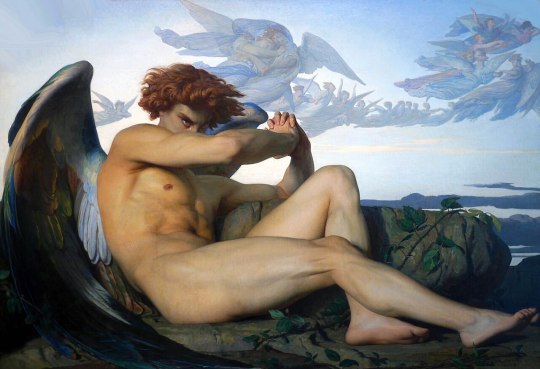
Alright, @greenpeacocks asked about the Ars Goetica and Lucifer. And I will do this in two different blogs, because both are more than enough for me to ramble on about for like 1k words. lol Because, oh boy, demonology and history are so interesting to cross over.
I will start with dear Lucifer.
Let me start with one question: Where does Lucifer come from? And what was he?
Chances are, you said, Lucifer was an angel who rebelled against God (with a capital-G) and because of that was cast out of heaven together with other angels, who rebelled. And now he either has become Satan, or is one of many demons/fallen angels in hell.
And with that you would be wrong.
See, something you have to understand about the Lucifer story, as written in the bible, is, that the Abrahamitic religions - as long as they had been Abrahamitic - had been monotheistic. Yes. However this religion came out of the Canaanite religion, which was a polytheistic religion, that eventually went back to Sumerian religion. I will for now not go into detail how that polytheistic religion became monotheistic. The tl;dr version of what religious scientists right now believe is this: There was an Egyptian weather god called Yahweh, that got imported into the Canaanite religion, where he eventually merged with the god Ba'al. One of the Canaanite tribes had this Yahweh/Ba'al eventually merge with the highest god of that religion, El, also known as Elohim. Which is why the bible uses both names for God. The last bit - him merging with El - is the important part.
Because in the Canaanite religion (probably going back to the Sumerian myths) there was a myth about the Morning God, Helel or Helal, who was the manifestation of Venus (aka the Morning Star), challenging El's position as the upper god of this pantheon. He was prideful because he was shining brighter than all the other gods, but for this challenge got eventually exiled from the realm of the gods for a while.
This does sound a bit familiar, right?
Well, what if I tell you, that in the untranslated version of the Bible the supposedly "rebelling angel" was actually called Helel?
Yeah, for some reason this big of old mythology just happened to survive into the bible. Helel was there, never being fully defined as an angel, but just as "a bright being of the sky", which was eventually by scholars interpreted as an angel.
"But," I hear you asking, "why do we call him Lucifer?"
Well, this is because of the Latin translation of the bible. See, when the bible - which originally was partly written in Greek, and partly in Hebrew - got fully translated into Latin, the people translating it realized that the name "Helel" did not mean anything to their audience. However, they were still aware of the origin of this story, and new that Helel was a name for the god of the Morning Star. So they just used the Roman name for the god of the Morning Star, son of the Aurora: Lucifer. A god, that in Roman mythology was not really meaningful. He shows up in a couple of Roman manuscripts that we have, but does not appear to have been prayed to a whole lot. And they put this name into the bible for this god/angel trying to take God's throne.
So, yeah. That is how we got Lucifer. A left over from an old religion.
Now, some of you might also have heard that Lucifer was originally a dragon. And of course, most of you think of Lucifer as Satan or the Devil. Why is that?
Well, both of these are related. Satan is twice described as a dragon in some parts of the bible. And in one of the scenes Satan is also cast down from the heaven. Now, Lucifer is not mentioned anywhere near that - but people went: "Huh, someone gets thrown down from heaven, so I guess that only ever happened once, so Lucifer and Satan are the same person and they are both an angel and a dragon!"
Whether or not Satan and Lucifer are eventually portrayed as the same character is very depedend on what source you might use. (Note, demonology developed during the second half of the middle ages and came up with a whole of its original rules for both demons and the hell or hells. In fact, a lot of depictions of hell and evil gods we see in modern fantasy and horror media, like DnD, Castlevania and so on, is more based on this demonology, than actual religious doctrine.) In a lot of Demonology they are differentiated, but once you are go more into Catholic depictions, they often get merged into one character.
I will probably write about the Ars Goetia later this week or on the weekend. Because that needs a whole lot of context. xD
#paradise lost#bible#bible study#christian mythology#abrahamitic religion#canaanite culture#sumerian mythology#sumerian gods#egyptian mythology#ancient religion#ancient history#lucifer#helel#hazbin hotel#helluva boss#angel sanctuary#castlevania#dungeons & dragons#dante's inferno
17 notes
·
View notes
Note
Hey! What are some good safety rules for joining covens. I know how easy it is for people to fall into cults and the new age pipeline. What are some good tips?
Watch out for the same kinds of red flags you'd watch out for anywhere else.
Do your own learnin' from reputable sources to get better at recognizing misinfo. Justin Sledge, Digital Hammurabi, Angela Puca, Andrew Henry, and Bart D. Ehrman are all great to check out.
Watch out for conspiracy thinking/conspirituality of the witchy kind; EG "long ago everybody worshiped the Goddess but then the Patriarchy demanded everybody worship a male god," "Lilith is actually a demonized Sumerian goddess," or "the Catholic Church is intentionally hiding the true religion from people." Here's a longer list of conspiracy theory stuff to watch out for.
Watch out for 'em getting caught up in apocalyptic UPGs, like "On X date the Old Gods will return and overthrow the Christian world order" or something.
If they act like you have to engage in some kind of edgy or sexual practice to progress, get away.
If they have a magical grindset (IE, basically acting like if you don't intend to become THE MOST POWERFUL PRACTITIONER then you might as well not bother), get away.
If they claim to be incarnated deities, get away.
If they're quick to throw around spiritual diagnoses (EG, "you have a shadow entity attached to you" or "that girl is possessed by an evil spirit"), get away.
If they're constantly complaining about dealing with negative entities or people with bad vibes, get away. Like you know the saying "if you meet one asshole you've met one asshole, if you met assholes all day then you're the asshole"? It absolutely applies in witchy matters.
If they make you feel like they're the only people you can trust to learn and grow, get away.
If their lore is obviously influenced by White Wolf tabletop games, Dungeons & Dragons, or other pop culture, and they expect you to take it very seriously, get away.
If they very seriously believe that hypnosis can help you uncover past life memories or repressed traumas, get away. (See hypnosis is unreliable for memory recovery, and this is one way we know.)
#answered#witchcraft#covens#red flags#red flag#spiritual red flags#spiritual red flag#witchblr#baby witch
81 notes
·
View notes
Text

The Coming Age issue 05, Winter 1977. This issue took me forever to get through! I don't know why I found it such a bore.
This issue is still entirely written on a typewriter, but it contains a little bit of organization on the inside cover that attempts to make it look more like a traditional magazine, rather than just pages of straight type-written essays, as the previous 4 were.
The article "The Rhythm of life" offers a quote from "the manual of Madrian ritual magic" and mentions it is available through the literature circle. This appears to be a lost text.
"A Legend of The Three Crowns" uses the phrases "brood of Ikral", "impure maids, handmaidens of Irkal", and "forces of Irkalla" which seems to be some dark force. I can't find any references to what "Ikral" is to the Madrians in this story. Although it is mentioned in conjunction with the grey and awful lands mentioned in the story in the previous volume. Google brings up the Wikipedia page for the ancient Mesopotamian underworld and says this was one of the Sumerian names for such. Doing a quick text search (because I was actually spelling it wrong previously) shows it popping up in other volumes of The Coming Age as the name of inverse of God, the Madrian version of Lucifer. I wonder if this was used as a proto-Pit or proto-Babylon. Another name for the current, fallen, world we live in.
"Penance: What it really Means - A Subject for Moura" starts out with the statement: "If Madrians were free to invent their religion as they went along, it would probably be good politics to leave penance and related subjects out of it as most modern cults do". This is very amusing. It also goes on to say "The goal of penance is a joy", this is less amusing knowing where their penchant for inflicting penance upon others lead them. Of course, in this article they're talking about prayer, but such statements were frequently used when they were more known for whips and canes rather than prayer, this feels like foreshadowing, but it's not fiction.
In the "appeal for issue six" it mentions that issue six will be fully printed in offset litho. I look forward to this, because reading 20 something pages of old blobby typewriter is difficult.
9 notes
·
View notes
Text
Submitted via Google Form:
What is the earliest point in evolution could humans evolve written language? Let's say biologically, human evolution was similar to reality, could say Neanderthals have written language already? Like before civilisations began? Also, written language is certainly not only for the elite. In fact, it got started in various families and then got spread among the tribes. So we have thousands of different tribes and familes across the world - each with their own languages and writing systems. Of course, there are some similarities as people have travelled a bit and met neighbouring tribes. So basically before society was properly formed into civilisations, there should already be writing but civilisation is actually what prodded society to centralise communications and languages. Does this work? Basically, I just want a society that had writing from much earlier on than reality and figuring out how it could have been done.
Tex: Writing is developed, much like any other tool, as a function of necessity. If it’s not necessary for a society to develop it, then writing won’t exist for them. Civilisation is also, as a concept, prone to periodic re-defining as we accumulate more data and our perceptions of the data shift (for example, one could define the pinnacle of civilisation as taxes, where before another defined it as religion). Writing also has exceptionally little to do with biology as writing is a social construct meant to fill a void found in one’s culture. Consequentially, writing can also encompass a broad range of intentional markings that demonstrate specific meanings, from tally marks, to standardized pictures, to ideograms, to glyphs. What does your world need writing for? What niche does it fill? What were the people using as its predecessor, and what happened to cause them to change systems? Did the scope of their needs change, or did the perception of their needs change? What information is important for them to record, on a societal and personal level? Who teaches writing? Who learns it? What is the method of transmission, and for those that teach writing, is it their sole occupation or something on the side?
Utuabzu: Writing is old. Really old. At least 5000 years old. This seems a long time, but humans have been living in permanent settlements and practicing forms of agriculture in West Asia for about 9000 years. Homo sapiens has been around for at least 300,000 years. But only in the last few thousand years, in a handful of places, did humans independently come up with the idea that the spoken word could be preserved using symbols that others could be trained to decipher.
The earliest writing as far as we can tell is cuneiform, from Sumeria in what is now southern Iraq. It may or may not have had some influence on the development of Egyptian hieroglyphs from pictographs to an actual script - we have found Sumerian cylinder seals in very early Egyptian sites, indicating that the two groups were in contact. But from these two points the idea of writing spread through the Mediterranean and West Asia. The Indus Valley civilisation also used a script, but we are unable to decipher it and have relatively few examples to work from, so we cannot tell if it even is a true script or if it predates contact with Sumeria.*
Shang Dynasty China also developed the earliest form of Chinese script from the Oracle Bone tradition not long after this. This also spread, together with Chinese ideas, agricultural and governmental practices across much of eastern Asia.
Meanwhile cuneiform script was adopted by a wide range of cultures in West Asia, and inspired other scripts like Elamite, Old Persian and Ugaritic, which while using similar shapes were structured very differently. Egyptian hieroglyphs inspired Anatolian hieroglyphs and were later in the early Iron Age the basis that the Phoenician alphabet** - ancestor of alphabetic, abjad and abugida scripts from the Philippines to Iceland - was derived from.
Another place we see writing develop entirely independently is in Central America, where a pictographic system was employed from the Olmec period all the way through to the 16th Century, but only became a true script in the Mayan region [at time, need to check when]. The system employed elsewhere in Mesoamerica did not have the capacity to accurately render speech, so far as we are aware.***
There are also a handful of other instances that might or might not be examples of true scripts developing entirely independently, from rorotongo on Rapanui to the quipus of the Andes to [pretty sure there's one in central africa, but can't remember the name just now]. We simply don't have enough information to be certain about any of them. Oftentimes, because the media they were written on does not survive all that well, or was deliberately destroyed.
But something you should bear in mind is that complex societies don't necessarily require writing for a lot of their history. Many of the most impressive cultures of the ancient world were not widely or at all literate. There's no indication that the Mississippian culture that built sites like Cahokia had writing, nor did Teotihuacán or the various cultures of the Andes. There's no evidence of writing at Great Zimbabwe, nor at Jomon sites in Japan.
Even in cultures that did have writing, it was frequently not a widely known skill. Your average ancient Egyptian couldn't read hieroglyphs, and Chinese hanzi still take years to master. This is part of why so many traditional scripts were displaced in the 19th and early 20th century. Most people couldn't read them and when authorities decided to use Roman or Cyrillic or something else in mass education, it very quickly became much more widely understood than the traditional script.
To my knowledge, there's no examples of a pre-agricultural society developing writing independently. Some have derived scripts from those they came into contact with, or made entirely unique ones inspired by writing they knew of. But so far as I am aware, none have ever created a script entirely from scratch with no prior exposure to the concept of writing.
*the Sumerians appear to have called the Indus Valley Civilisation 'Meluhha', and were actively trading with it from at least the Bronze Age. Ur III records even tell of a colony of Meluhha merchants at Guabba, near Lagaš, and Sumerian cylinder seals have been found in Indus Valley sites.
**actually an abjad.
*** the conquistadors burned almost all pre Columbian codices, so we can't ever be 100% certain that no other variants of the system developed into true scripts. But it's unlikely.
25 notes
·
View notes
Text
The Many Lives of Mongolian Shamanism

The following is excerpted from Sky Shamans of Mongolia: Meetings with Remarkable Healers by Kevin Turner.
For thousands of years, Mongolia has been a nexus of Eurasian shamanisms that competed, mixed, and meshed across our planet's largest continent. Shamanism appears to have emerged with the very dawn of human consciousness, but archeologists can probably speak with confidence about only the past 30,000 to 70,000 years.
Archeological discoveries in Eurasia alone indicate that the practice of shamanism reaches back at least to 35,000 BCE, easily making shamanism the oldest spiritual practice known to mankind. Modern religious faiths such as Buddhism and Christianity are toddlers in comparison, and psychology is a mere newborn.
The word shaman originated from the Tungusic tribal language groups (from areas to the north and east of Mongolia), which are related to Mongolic languages. These are both part of the broader Altaic language group, which includes Turkic, Manchurian, and scores of other Inner Asian and Siberian languages, and may include Korean and Japanese at the easternmost reach. The modern term "shaman" has now been adopted by many as a catch-all word to describe those who by spiritual means seek direct access to information and healing power not ordinarily available.
The nomadic northern Siberian shamanic traditions tend to retain the highly individualistic aspects of shamanism; by contrast, a most interesting facet of Mongolian and Inner Asian shamanism is the amalgamation of the shamans' direct experiences of other realities with a religious belief system known as Tengerism (Heaven or Sky God-ism). Tengerism originated in Sumeria, one of humanity's earliest civilizations, and probably derived from the early experiences of the shamans, prophets, and mystics of pre-Mesopotamian eras.
The modern Mongolian term Tenger (or Tengri), meaning both "sky realms" and "sky spirits," almost certainly derives from the Sumerian word Dingir, also meaning both "sky realm(s)" and "deity(-ies)." The concept of divinity in Sumerian was closely associated with the heavens, evident from the shared cuneiform sign for both heaven and sky, and from the fact that its earliest form is a star shape. The name of every deity in Sumerian is prefixed by a star symbol.
Mircea Eliade proposed that Tengrism may be the closest thing we have found to a reconstructed proto-Indo-European religion. It is also evident that Tengrism's three-layered worldview is nearly identical to the tripartite world found in many kinds of shamanism, as well as the Vedic triloka ("three realms") world structure.
In Mongolian, one who travels the realms of the Tengers is called a Tengeri--"sky-dweller; sky-walker." I like to think that Luke Skywalker, the young warrior-shaman Jedi knight of the fictional Star Wars films, may have inherited his name from this tradition. Interestingly, the BBC reports that in censuses taken in 2001 regarding spiritual beliefs, hundreds of thousands of people selected "Jediism" as their faith of choice--such is the power of shamanism even in our modern myths and legends.
The earliest authenticated records of Mongolian shamanism go back to the beginnings of the Hunnu Dynasty, 209-93 CE (also known as the Xiongnu in Chinese records). Mongolian legend tells us that, during this time, a nine-year-old Hunnu boy united with a she-wolf, engendering the modern-day Mongolian people. The headdress of a shaman (circa 300–100 BCE) was found in one of the graves of Noin-Ula (Mongolian: Noyon uulyn bulsh) in northern Mongolia, and is strikingly similar to the Mongol Darkhad headdress of today. The fabric's colors, weaving methods, and embroidery are also similar to those found in fabric produced by Scythians in the Greek colonies on the Black Sea coast, leading scholars to draw links between these ancient cultures. (Scythian tribal areas were just west of Mongolian territories.)
According to historian and researcher Otgony Purev, shamans played an important role in diplomatic efforts and treaties with neighboring nations. The Hunnu emperors even constructed permanent shamanic shrines, and encouraged individual shamans to synthesize their diverse practices into a national religion. "Shamanist religion" then became part of the organizational basis of governmental and military activity.
Shamanism became the main source of education and ideology for the earliest pre-Mongol states. This continued for nearly 400 years, and ties to education remain influential in the Mongolian shamanic revival even today. With the disintegration of the Hunnu Dynasty, institutionalized shamanism returned to its more natural, individualistic and autonomous forms across a series of disparate Inner Asian kingdoms that spanned a millennium.
31 notes
·
View notes
Note
Now, what I was actually getting to in the ask before I pocket sent. Onto names and languages
In regards to Liochant, it is of my belief that he doesn't use his actual name but a metaphorical translation. His actual name being Lais Ravanah Havilah, or Lions Roar of the Sands. First two names being translated to Lions Chat then to Liochant. In his native writing system, it's ꖎᔑ╎ᓭ ∷ᔑ⍊ᔑリᔑ⍑ ⍑ᔑ⍊╎ꖎᔑ⍑ (minecraft enchantment table)
Kul'Zak was fun for me because his name reminds me of Aztec and he is the only one we don't have a definitive country/region of origin of or region of worship, meaning I can go full Aztec on this one while making it fit.
While the majority of the Divine Warrior names are rather random or made up. (Chosen from video game characters and such) Enki is actually named after the Sumerian god of magic and wisdom so me naming Kul'Zak after an aztec God wouldn't be out of place. Well, at least as not as out of place as Shad, who is one letter away from just being called Chad. Anyway, this is why I am headcannoning that Kul'Zak unshortened/un-nicknamed name is Quetzalcóatl, named after the aztec God of Winds, Rain, and a Creation.
While out of order it does share similar speech pronunciations, and as some who has had friends with an indeginous aztec name, people will give the wildest nicknames to them instead of actually pronouncing it. (Rip my old friend Xóchitl, who teachers just referred to as Zoey, Texas things y'all.)
oooo i love name stuff.
Avra is actually a name in a language i made for my rewrite. It's basically an in-world equivalent of 'Jane Doe'. it means a (typically, but not exclusively) feminine individual without a name, or known identity. In some areas, the differentiations between the versions of the name (Avra, Avre, Avron) are regional instead of gender-based, or refer to different religions.
It comes from the word Avret (to not have a name, which derives from Aven - name, and Rel - to not have).
-A is the typical suffix for: individual feminine, someone who is soft spoken, someone who believes in wild gods, or someone with dark hair.
The name is used for unnamed newborns, unidentified corpses, or those who wish to revoke their names for some 'higher purpose'. this is also often used to refer to strangers, in a more casual manner. because of this, when Avra is referred to as such in texts, people just assume she doesnt have a name, and add 'nameless' to a bunch of her titles.
16 notes
·
View notes
Text
By the end of the second millennium, the religious thinkers of Mesopotamia saw the cosmos as controlled and regulated by male gods, with only Ishtar maintaining a position of power. When we see such a pattern of theological change, we must ask whether the religious imagery is leading society, or whether it is following socioeconomic development? Was the supplanting of goddesses in Sumerian religious texts an inner theological development that resulted purely from the tendency to view the world of the gods on the model of an imperial state in which women paid no real political role? Or does it follow in the wake of sociological change, of the development of what might be called "patriarchy"? And if the latter is true, is the change in the world of the gods contemporary to the changes in human society, or does it lag behind it by hundreds of years? To these questions we really have no answer. The general impression that we get from Sumerian texts is that at least some women had a more prominent role than was possible in the succeeding Babylonian and Assyrian periods of Mesopotamian history. But developments within the 600-year period covered by Sumerian literature are more difficult to detect. One slight clue might (very hesitantly) be furnished by a royal document called the Reforms of Uruinimgina." Uruinimgina (whose name is read Urukagina in earlier scholarly literature) was a king of Lagash around 2350 B.C.E. As a nondynastic successor to the throne, he had to justify his power, and wrote a "reform" text in which he related how bad matters were before he became king and described the new reforms that he instituted in order to pursue social justice. Among them we read, "the women of the former days used to take two husbands, but the women of today (if they attempt to do this) are stoned with the stones inscribed with their evil intent." Polyandry (if it ever really existed) has been supplanted by monogamy and occasional polygyny.
In early Sumer, royal women had considerable power. In early Lagash, the wives of the governors managed the large temple estates. The dynasty of Kish was founded by Enmebaragesi, a contemporary of Gilgamesh, who it now appears may have been a woman; later, another woman, Kubaba the tavern lady, became ruler of Kish and founded a dynasty that lasted a hundred years. We do not know how important politically the position of En priestess of Ur was, but it was a high position, occupied by royal women at least from the time of Enheduanna, daughter of Sargon (circa 2300 B.C.E.), and through the time of the sister of Warad-Sin and Rim-Sin of Larsa in the second millennium. The prominence of individual royal women continued throughout the third dynasty of Ur. By contrast, women have very little role to play in the latter half of the second millennium; and in first millennium texts, as in those of the Assyrian period, they are practically invisible.
We do not know all the reasons for this decline. It would be tempting to attribute it to the new ideas brought in by new people with the mass immigration of the West Semites into Mesopotamia at the start of the second millennium. However, this cannot be the true origin. The city of Mari on the Euphrates in Syria around 1800 B.C.E. was a site inhabited to a great extent by West Semites. In the documents from this site, women (again, royal women) played a role in religion and politics that was not less than that played by Sumerian women of the Ur IlI period (2111-1950 B.C.E.). The causes for the change in women's position is not ethnically based. The dramatic decline of women's visibility does not take place until well into the Old Babylonian period (circa 1600 B.C.E.), and may be function of the change from city-states to larger nation-states and the changes in the social and economic systems that this entailed.
The eclipse of the goddesses was undoubtedly part of the same process that witnessed a decline in the public role of women, with both reflective of fundamental changes in society that we cannot yet specify. The existence and power of a goddess, particularly of Ishtar, is no indication or guarantee of a high status for human women. In Assyria, where Ishtar was so prominent, women were not. The texts rarely mention any individual women, and, according to the Middle Assyrian laws, married women were to be veiled, had no rights to their husband's property (even to movable goods), and could be struck or mutilated by their husbands at will. Ishtar, the female with the fundamental attributes of manhood, does not enable women to transcend their femaleness. In her being and her cult (where she changes men into women and women into men), she provides an outlet for strong feelings about gender, but in the final analysis, she is the supporter and maintainer of the gender order. The world by the end of the second millennium was a male's world, above and below; and the ancient goddesses have all but disappeared.
-Tikva Frymer-Kensky, In the Wake of the Goddesses: Women, Culture, and the Biblical Transformation of Pagan Myth
#Tikva Frymer-Kensky#Ishtar#female oppression#mesopotamian mythology#goddess erasure#ancient history#religious history
28 notes
·
View notes
Text

Who is Levi?
Leviathan, Hebrew Livyatan, in Jewish mythology, a primordial sea serpent. Its source is in prebiblical Mesopotamian myth, especially that of the sea monster in the Ugaritic myth of Baal (see Yamm). In the Old Testament, Leviathan appears in Psalms 74:14 as a multiheaded sea serpent that is killed by God and given as food to the Hebrews in the wilderness. In Isaiah 27:1, Leviathan is a serpent and a symbol of Israel’s enemies, who will be slain by God. In Job 41, it is a sea monster and a symbol of God’s power of creation
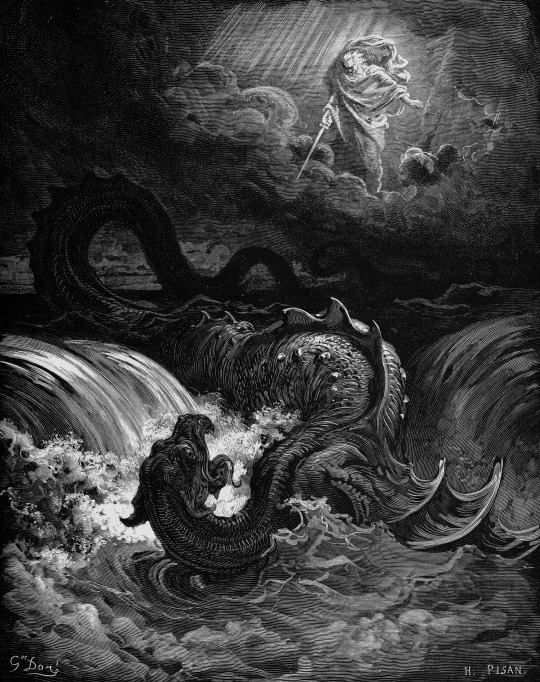
Etymology:
Gesenius (among others) argued the name לִוְיָתָןwas derived from the root לוה lwh "to twine; to join", with an adjectival suffix ן- ָ, for a literal meaning of "wreathed, twisted in folds". If it exists, the adjectival suffix ן- ָ (as opposed to -ון) is otherwise unattested except perhaps in Nehushtan, whose etymology is unknown; the ת would also require explanation, as Nechushtan is formed from neḥšoeṯ and Leviathan from liveyah; the normal-pattern f.s. adjective would be לויון, liveyon. Other philologists, including Leskien, thought it a foreign loanword. A third school considers it a proper noun. Bauer proposed לוית+תן, for "wreath of serpent."
Both the name and the mythological figure are a direct continuation of the Ugaritic sea monster Lôtān, one of the servants of the sea god Yammu defeated by Hadad in the Baal Cycle. The Ugaritic account has gaps, making it unclear whether some phrases describe him or other monsters at Yammu's disposal such as Tunannu (the biblical Tannin). Most scholars agree on describing Lôtān as "the fugitive serpent" (bṯn brḥ) ,but he may or may not be "the wriggling serpent" (bṯn ʿqltn) or "the mighty one with seven heads" (šlyṭ d.šbʿt rašm). His role seems to have been prefigured by the earlier serpent Têmtum whose death at the hands of Hadad is depicted in Syrian seals of the 18th–16th century BC.

Mythology:
Sea serpents feature prominently in the mythology of the ancient Near East. They are attested by the 3rd millennium BC in Sumerian iconography depicting the god Ninurtaovercoming a seven-headed serpent. It was common for Near Eastern religions to include a Chaoskampf: a cosmic battle between a sea monster representing the forces of chaos and a creator god or culture hero who imposes order by force. The Babylonian creation myth describes Marduk's defeat of the serpent goddess Tiamat, whose body was used to create the heavens and the earth.
—all art was found via Google, it doesn’t not belong to me, but to the artist who created it. If you see any art depicted on my channel that is yours and you do not want it shared, just tell me, I’m on your side ^_^-
#obey me#obey me shall we date#obey me leviathan#obey me!#obey me demonology#obey me origins#3rd husband
87 notes
·
View notes
Text
How the Bible religion✝️ was heavily influenced by Mesopotamian gods with different dialect and names. Mesopotamia was a region in the middle east - including Israel. The bible god Yahweh is ENLIL / Ēl. The main god of the sumerians was Enlil "LORD of the universe", "father", "king", "the great mountain" (Mount Zion). The mesopotamian/sumerian clay tablets (𒅴𒂠) are 4,000-10,000 years old - older than the Bible Papyri.
#My edit#Topics that i research about#cult of zion#zionism#cult of yahweh#archeology#babylon#sumeria#mesopotamia#Corina Pataki#Elena Danaan#bible#Enlil#Yahweh#many “gods”/rulers and not just one
9 notes
·
View notes
Text
Enheduanna 𒂗𒃶𒌌𒀭𒈾
A high priestess of the moon god Nanna (Sin) 𒀭𒋀𒆠, who was the patron god of the ancient city of Ur and daughter of Sargon 𒊬𒊒𒄀 of Akkad, who ruled Ur about 2334-2279 BCE, is the celebrated as the first author in history.


By Mefman00 - This file has been extracted from another file, CC0, https://commons.wikimedia.org/w/index.php?curid=77518127
While stories and poems have been part of human history for as long as we have been humans, prior to Enheduanna, no one had signed their name to their work in a way that reached through time to the present. As far as we can tell from archaeology, she was remembered until the end of the First (or Old) Babylonian Empire, which ended around 1595 BCE, about 684 years after the end of her father's reign. For context, that's as far removed as we are from Chaucer's works! It was in 1927 that Sir Leonard Wooley uncovered a disk with her name, her relationship to Sargon of Akkad, and her occupation on it and then later tablets that also contained her name and her works.
Sargon founded the Akkadian Empire and Ur was a Summerian city that he conquered. It was traditional in that time to solidify relationships of cities, whether through peaceful or warlike methods, to somehow join the gods of the city. To this end, Sargon appointed Enheduanna to be the high priestess of Nana in Ur since Nana was the patron god there, which also was a very high rank within the city since there wasn't really a separation between religion and government at the time.
She continued to serve in this position even through the reign of Narum-Sin 𒀭𒈾𒊏𒄠𒀭𒂗𒍪, grandson of Sargon, her nephew. There are hints in her song Nin me šara (the Exaultation of Inana) of a rebellion by Lugal-Ane, who demanded that Enheduanna confirm him as king of Ur in rebellion against her nephew's reign. Because she refused and was forced to take refuge in the city of Ĝirsu, where she composed her song to Inanna. After her nephew reconquered Ur, she most likely returned to Ur, which is probably why her disk was found there.
We don't know how many works Enheduanna wrote, but there are many temple hymns in addition to The Exaltation of Inana, which is one of the most complex Sumerian texts that we currently have. Part of why we still have access to her work is that scribes through the First Babylonian Empire used her work to learn their craft.
There is some debate about her authorship, given that the sources we have now don't appear to be written in old Sumerian, but rather in the dialect of the day, which makes it hard for us to know for sure that the poems are as old as they claim to be. It would be like finding the Canterbury Tales only in modern English. That said, her works have a long legacy and are worth exploring.
The Exaltation of Inana
Inana and Ebiḫ
Hymn to Inana
Temple Hyms Collection

By Sailko - This file has been extracted from another file, CC BY 3.0, https://commons.wikimedia.org/w/index.php?curid=88240025
5 notes
·
View notes
Text
Anime's Greatest Chad: The Epic of Gilgamesh (Fate)
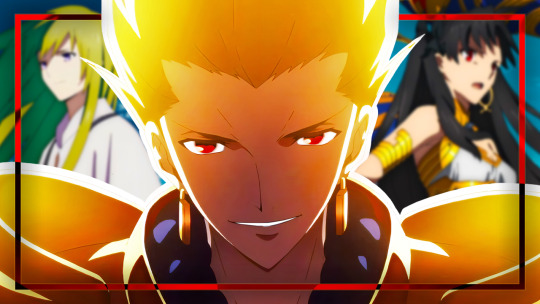
Gilgamesh is known as mankind's first hero.
But his story isn’t limited to just the Fate series. In fact, it’s shaped our modern lives more than you could ever imagine.
If you’re here for a historically accurate depiction of the man who tried to conquer death, don’t leave. I’ve worked really hard to make this as accurate as possible.
And if you’re here for the story of the real anime Gigachad, and how he goes from an arrogant dictator to a benevolent king.
Then grab a drink and some snacks, because this, is the tale of the Hero of Heroes.

Roots of the King
Before we jump into the Epic of Gilgamesh, it’s worth taking a second to understand the roots of this iconic character and his influence on human culture and literature.
Mesopotamia was a region in 3100 BC, now covered by Iraq, Syria, and Turkey. It had its fair share of events, from the reigns of Sumerians and Akkadians to being eventually conquered by Alexander the Great in 332 BC.
But nestled within this timeline is a certain story that’s so profound, so raw, it's been echoing for millennia.
Now I know what you’re thinking.
"I'm here for anime, not a history lesson."
But the thing is, all evidence points to Gilgamesh actually existing 5000 years ago. And his legend is recorded in mankind’s oldest poem, the Epic of Gilgamesh.
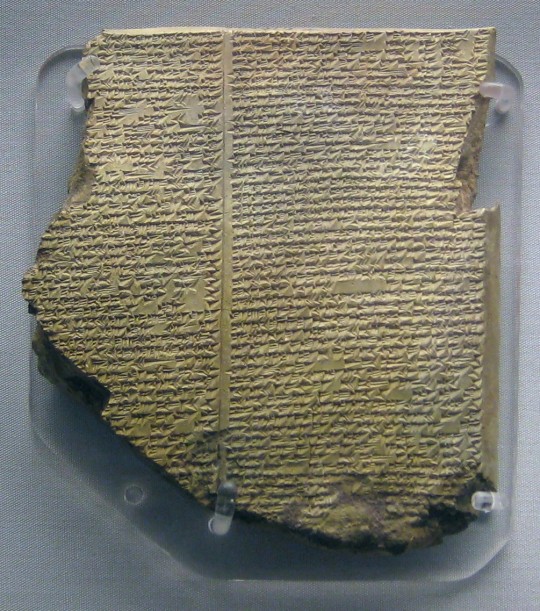
The epic is thought to have been orally transmitted for generations before it was finally written down on clay tablets in the cuneiform script, which was one of the earliest systems of writing.
To put into context how old that is, it makes him almost 3000 years older than Jesus.
But I wouldn’t take EVERYTHING that follows as being literal. Just know that some of the stuff is actually reported to have happened.
The Hero of Heroes
Gilgamesh is known as the King of all Heroes because every single myth that followed, every story, every legend from every culture and every religion in every country, it all borrows inspiration from mankind’s first hero.
The strongest examples of this are in the Biblical tale of Noah and the Greek myth of Hercules. And his story greatly influences modern literature too, like The Lord of the Rings and A Game of Thrones.
The story of the Epic of Gilgamesh was discovered on 12 clay tablets found among the ruins of the ancient library of Ashurbanipal, the last great king of the Neo-Assyrian Empire.
These tablets, inscribed with cuneiform script, are dated to around the 7th century BC but are believed to preserve much older stories that were likely first told orally and later written down.
These ancient tablets provide the most comprehensive version of the epic, but parts of the tale also appear on other scattered fragments found at different ancient sites across the Middle East.
There are actually two versions of Gilgamesh in the Fate series and they’re technically different people.
Well, they’re not, but they kind of are.
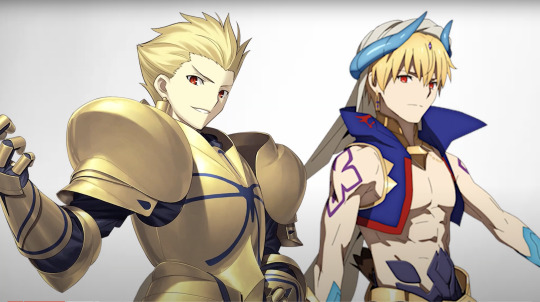
Archer Gilgamesh
We’re in the year 2800 B.C., the Age of the Gods, where divine beings and humans walked the Earth together.
Some Gods were just, while others treated their subjects as slaves.
One day, a greater god called Sefar invaded the Earth, killing many of the Gods.
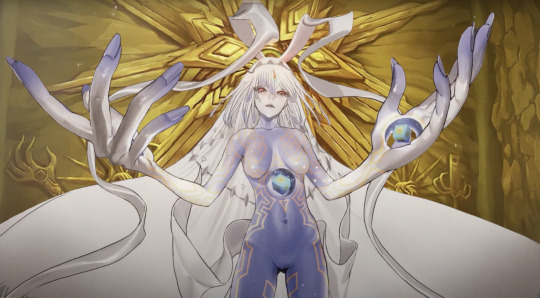
She was eventually defeated, but the damage was already done, and the rule the gods had over the humans had severely weakened.
In order to preserve their rule, the gods needed a keystone, a Wedge of Heaven that connected the rising humans to the fading gods.
That keystone was Gilgamesh.
Born from the Goddess Ninsun and the Human King Lugalbanda, Gilgamesh was two-thirds God, and one-third human, and ruled over humanity with the mission to observe and adjudicate.
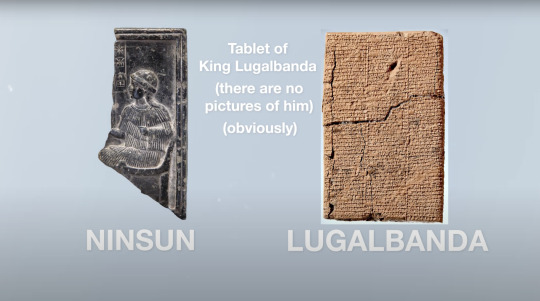
The Fortress City
The city Gilgamesh ruled over was called Uruk, situated in present-day Iraq.
Yet, Uruk was far from ordinary.
It stood as a testament to human achievement, its towering walls not just architectural marvels but also echoes of the ambitions of its people.
Conceived under the watchful eye of Gilgamesh, these walls became more than mere defensive structures; they symbolised humanity's victory over nature. This audacious statement reflected Gilgamesh's own beliefs: that he stood above nature itself.

As evidence of its profound legacy, archaeologists pinpoint Uruk as one of humanity's earliest urban epicentres, with roots as deep as 4000 BCE. Its intricate temples, ziggurats, and canal systems all serve as relics of its storied past.
The Tyrannical King
This transcendence over nature, and the very walls that proclaimed it, became the lens through which Gilgamesh viewed himself.
To him, the limitations of divinity and humanity were but mere lines in the sand.
He believed that while no human could rival the gods, the gods themselves could never experience the complexities of human existence.
And since Gilgamesh was both human and God, he perceived himself not just above his subjects, but even the deities that breathed life into him.
His self-awareness was, in many ways, his crowning achievement.
Gilgamesh grew to become a cruel, arrogant, and oppressive tyrant who subjugated his people to forced labour and sexual abuse.
And just to be clear, I’m downplaying that a lot because even I don’t want to talk about some of the disgusting things he is historically reported to have done.
And it makes me wonder how he ever became a Heroic Spirit in the first place.

The Man Made of Clay
Naturally, the gods didn’t want this, but they couldn’t exactly do anything about it because, well, Gilgamesh just wouldn’t submit to them.
So instead, the King of God’s Anu, and the Goddess of Creation Aruru, created a monster out of clay called Enkidu, to punish the arrogant king.
But there was a problem.
You see, Enkidu didn’t have a soul, and so couldn’t make rational decisions.
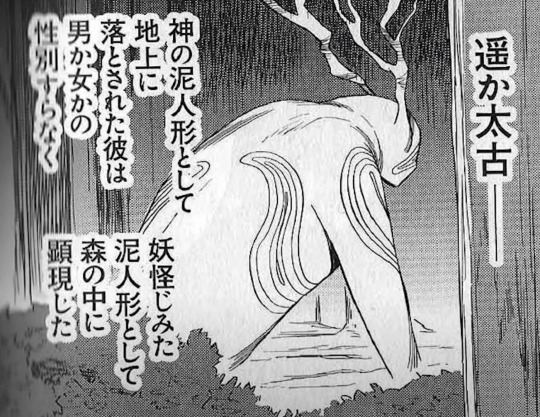
So the gods sent a divine harlot to sleep with him. (And I’m not even joking.)
After this, Enkidu takes human form, and his final appearance is very similar to the girl he slept with. And that’s why he has such a feminine form.
(It’s definitely not because having more hot girls leads to more sales)
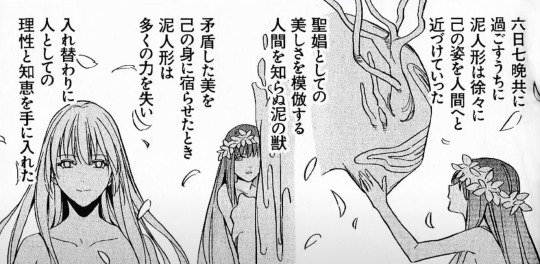
Noble Phantasm's
Before we dive into what happened between Gilgamesh and Enkidu, let’s talk about Gilgamesh’s powers, or more specifically, Archer Gilgamesh’s powers.
In Fate, heroic spirits have Noble Phantasms, which are special weapons or abilities that embody the legend of that hero. For example, King Arthur’s Noble Phantasm, or rather, Artoria’s Noble Phantasm (Again, because more hot girls = more sales), is Excalibur, the sword of promised victory.

Gilgamesh has a lot of Noble Phantasms, and I mean, A LOT. It would take me a decade to cover them all, but I’ll talk about a few.
Sha Naqba Imuru:
The first is his ability Sha Naqba Imuru, or Clairvoyance, which lets him see into the future and see the truth of anything he looks at.
So in a fight, he knows exactly who his opponent is, what their abilities are, and how best to defeat them. Or if he’s playing chess, then he knows the correct move every time.

This ability is pretty OP but the thing is, Gilgamesh barely uses it.
Why?
Because he’s an arrogant prick.
He believes himself to be so powerful, that he doesn’t even need it most of the time.
And uhm… he’s kinda right...
Especially when you learn about his next Noble Phantasm.
The Gate of Babylon:
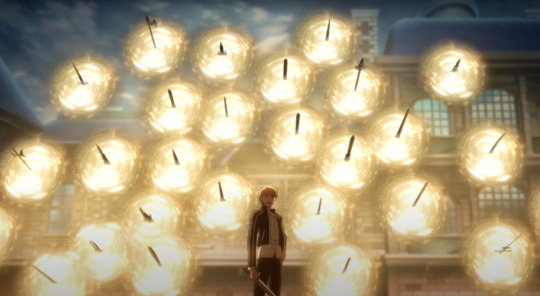
During his time as ruler of Uruk, Gilgamesh amassed every single weapon on Earth and stored them all in his treasury.
And I genuinely mean, every single weapon.
And the Gate of Babylon allows him to choose whichever weapon he wants, whenever he wants, wherever he wants.
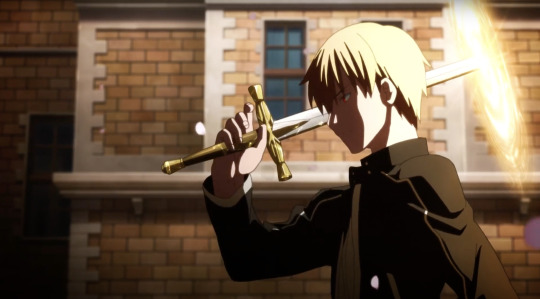
But that’s not how Gilgamesh uses it...
Every single weapon is fired out at a speed of Mach 10, and he has so many, that he could go his entire life firing them away without having to use a single one twice.
What makes this ability even more OP, is that these weapons aren’t just ordinary weapons. Every single one of them is a Noble Phantasm in itself. Artoria’s Excalibur, Lancer’s Gae Bolg, Hercules’ Nine Lives, Gilgamesh has all of these weapons in his treasury.
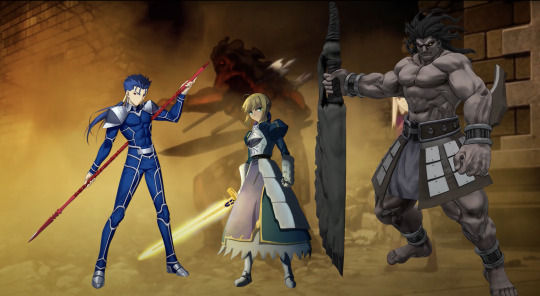
But how is that possible if these heroes came AFTER Gilgamesh?
Well. That’s because they’re prototypes.
I mentioned earlier that almost every legend told today is in some way inspired by the Epic of Gilgamesh. And in the same way, every weapon used today has a design that is somehow based on those in his treasury.
He owns every weapon that existed and owns every weapon that is yet to exist.
And don’t get me wrong.
While they’re technically prototypes, it is said that if you compare the original weapon to Gilgamesh’s prototype, the original will look like a fake, that’s how well-made the prototype is.
Not only that, but in a fight, the prototype will beat the original every time.
Now that doesn’t mean that if Gilgamesh were to use Excalibur and fight Artoria in a 1 on 1 swordfight that he would win.
He’d probably lose.
And that’s because he’s a jack of all trades but master of none.
Gilgamesh is a brilliant swordsman. But these other heroic spirits have spent their entire lives mastering a single weapon, and thus can use them to their full potential, which Gilgamesh cannot.
That being said. Gilgamesh DOES have one weapon that only he can use, one so powerful that it defies reality itself. Buuuuut I’ll talk about that later.

The Great Battle
Enkidu eventually confronts Gilgamesh outside of the Temple of Uruk, stating that he needed to be punished for disobeying the gods.
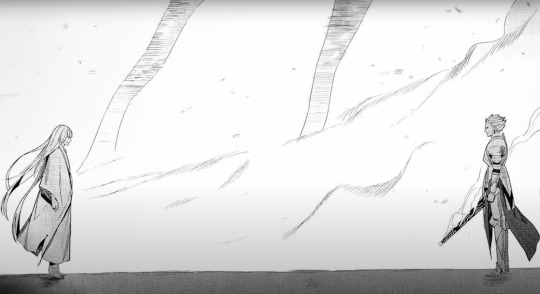
But Gilgamesh isn’t one to let anyone talk down on him.
So he engages Enkidu in a battle that lasts days on end.
And this was pretty new to Gil. It was the first time he ever came across someone equal in strength to him, which forced him to use his Gate of Babylon.
Gilgamesh was furious that someone had caused him to waste his weapons, he was humiliated.
But eventually, he stopped caring, and he even started to enjoy himself after finally finding someone worthy to be in his presence.
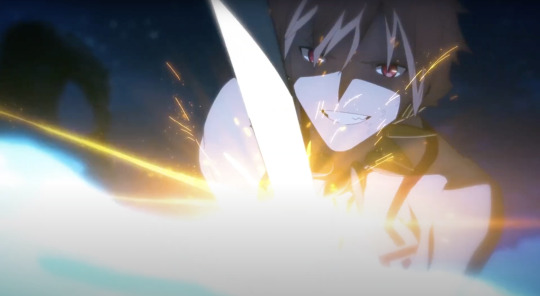
This battle lasted so long and was so fearsome that Gil exhausted every single weapon in his treasury, but by this point, Enkidu was severely weakened and Gilgamesh had won.
But instead of finishing him off, Gilgamesh extended a hand to him.
He saw Enkidu as an equal, and Enkidu ended up becoming Gil’s first friend, his only friend.
Friendship
One day, Gilgamesh set his sights upon defeating the Beast of the God’s, Humbaba.

But the thing is, the God’s hadn’t told him to do this, and he wasn’t doing it for the sake of his people either, because, well… he didn’t care about them.
Gilgamesh simply saw Humbaba as something that needed to be removed from the Earth in order to see out his mission.
Gilgamesh had always disobeyed the God’s so that he could be far removed from them, and he wanted his people to hate him so that he could be far removed from them, because that was the only way he could be truly neutral, because that was the mission for which he was born.
In this sense, you could argue that the reason that Gilgamesh was such an abhorrent dictator, was because he didn’t want to get close to his subjects, so that he could remain impartial.
(I don’t know how much truth there is to that and it could simply be a result of the story being altered as it was passed from generation to generation.)
Either way, seeing Gilgamesh’s resolve, Enkidu pledges his loyalty to him, and the two go on numerous adventures together, which ends with Gilgamesh becoming the wealthiest and most powerful king on Earth.
He amassed so much power that even the gods had no choice but to acknowledge it. One Goddess in particular, Ishtar, the Goddess of Fertility, asked Gilgamesh to marry her.
The King's Loss
Marrying a Goddess was actually one of Gilgamesh’s duties as it would see the continued reign of the gods over the humans, but Gilgamesh said no.
Enraged, Ishtar went to her father Anu, and asked him to unleash the Divine Beast Gugalanna on Uruk.
This divine beast devastated the lands for 7 years before Gilgamesh and Enkidu were finally able to defeat it. But this came at a price.
Ishtar asked the gods to sentence Gilgamesh and Enkidu to their deaths. While the Gods agreed, they couldn’t do anything to Gil, but they could to Enkidu, because he was their direct creation.
Enkidu’s clay body weakened and weakened until it would eventually return to the very Earth from which it had come.
Gilgamesh stayed by his friend's side until the very end.
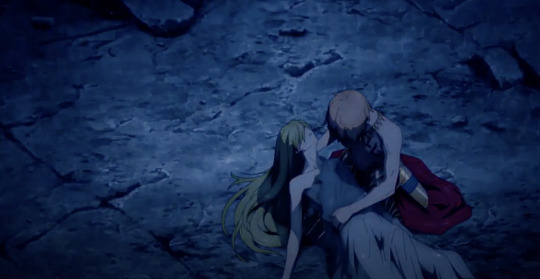
While this event is not shown directly shown in the anime, it is mentioned in the original Sumerian poem from three thousand years ago, translated as follows:
“It saddens me. It saddens me, Gil. Who would understand you after I die? Who else would march by your side? My friend… when I think you will live on all alone henceforth, I can’t help but shed tears. But don’t be saddened. For I am but another of your treasures.” - Enkidu

It’s honestly a rather heartbreaking end to their friendship.
One would have thought that the arrogant and prideful King of Heroes would have had a rather stoic response. But history says otherwise:
"You do have worth. You alone have this worth. I hereby declare: In all this world, only one shall be my friend. Thus---not for all eternity shall his worth ever change." - Gilgamesh
And with this, Enkidu returned to the Earth, leaving nothing behind but Gilgamesh's thunderous cry.
And for those of you who have watched Fate Zero, you’ll know that Gilgamesh kept this promise, even thousands and thousands of years later.
The Herb
After Enkidu’s death, Gilgamesh realised something.
As he was one-third human, he too would one day die.
If this were to happen, he would not be able to fulfil his dream of watching over humanity until the end of time, and it also meant he would not be able to carry out his purpose as the Wedge of Heaven.
And thus, for the first time in his existence, the king of heroes felt fear.
And this brings us to the core of the ancient Sumerian poem.
Gilgamesh, wanting to beat death, set out on a journey to find the only treasure that he didn’t have in his vault—the Herb of Immortality.
What does this herb do?
Well, it’s in the name so figure it out for yourselves.
Gilgamesh wandered the Earth for several decades in search of this herb, and eventually, stumbles upon a wise sage in the underworld that guides him in the right direction.
Sure enough, Gil finds the herb and is absolutely euphoric, because he has just beaten death, and all that’s left for him to do, is return to Uruk, and see over his people until the end of time.
Before beginning his journey back home, Gil decides to wash off in a nearby spring, where he first places the herb on the ground. However, as fate would have it, a serpent stumbles upon the bathing Gilgamesh, and after seeing the herb, it eats it.
And a little fun fact. It’s thought that the Sumerians and many of the cultures that followed, believed that snakes have the ability to shed their skin because this serpent ate the herb of immortality, giving snakes the ability to be reborn.
Much like the biblical tale of Adam, Eve, and the serpent, this story serves as a stark reminder of life's impermanence and the inevitable reality of death.
By losing the herb, Gilgamesh confronts the bitter truth: immortality remains beyond human grasp.
After realising what happened, you’d think Gilgamesh would be upset, or that he would be outraged, but, he wasn’t.

He realised that death was unavoidable and that by dying, he wasn’t abandoning his duty, he was completing it, because it was the most human thing he could do.
He realised that you didn’t die because you were human, but you were human because you died.
And with his Sha Naqba Imuru, Gilgamesh was able to see into the future, and what he saw was exactly what he loved about the humans in the first place.
He saw the continued growth of the human race, the way their knowledge developed, and the way they used their resources to reach for the stars and beyond.
With this new outlook, Gilgamesh returned to Uruk as a changed man.
Caster Gilgamesh
While Archer Gilgamesh was an arrogant tyrant that did disgusting things, Caster Gilgamesh was kind, generous, and benevolent.
He loved his people so much that he actually gave away all the swords in his treasury.

You see, these two versions of Gilgamesh are still the same person. It’s just that Archer Gilgamesh is the version of Gilgamesh we see before Enkidu’s death, and Caster Gilgamesh is the one we see after the death of his friend.
And yes, technically, Caster Gilgamesh is weaker than Archer Gilgamesh, and the biggest reason for that is the fact that he gave away so many of his weapons, weakening his Gate of Babylon.
But Caster Gilgamesh also had a noble phantasm that Archer Gilgamesh didn’t, Melammu Dingir, or King’s Signal Cannon.
If you’ve ever seen the movie Three Hundred, it’s a lot like that. But except for arrows, he’s firing every weapon he has at his disposal.
As I mentioned, Caster Gilgamesh was much more generous than Archer Gilgamesh, and he gave away his treasures for them to be used in cannons, should the city of Uruk need protection.
As such, this Noble Phantasm is classed as an Anti-Army ability, firing every weapon mankind had in one go.
But if you think that’s powerful, there’s one more noble phantasm I haven’t yet mentioned. But this one didn’t belong to Caster Gilgamesh, it belonged to Archer Gilgamesh.
The Sword of Rupture
Imagine a weapon so mighty that it not only holds power beyond comprehension but also taps into the very essence of our universe's creation.
Enter Ea, the sword of rupture.

But is it even correct to call it a sword?
Ea is the pinnacle of Noble Phantasms and is the strongest weapon in Gilgamesh’s treasury and it is unique to only him.
You might think it kind of looks like a sword, but it actually isn’t. It was designed before the concept of a “sword” even existed and so, it’s in its own class.
To even summon Ea, Gilgamesh first has to unlock the depths of his treasury with a key that only he possesses, and after that, we see the mere act of obtaining Ea disrupts reality itself.
Designed intricately, each section of Ea represents the Heaven’s, the Earth, and the Underworld, with the sections rotating in opposite directions, echoing the universe’s vast expanse.
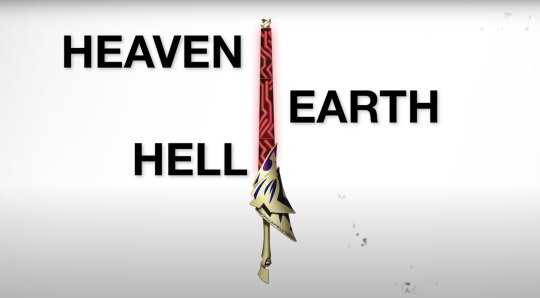
Gilgamesh claims that the sword "knows the truth" of the world where it once existed, and by using its power, it is able to bestow its knowledge upon others.
The weapon holds memories of a time even before the planet existed, a time when life, as we understand it, couldn't have survived. The memory of our universe's raw, primordial form, a chaotic blend of scorching heat and biting cold, of molten lava and dense gas, long before life as we know it began.
This primordial memory is embedded deep within our very DNA, a distant echo from eons past, now faded from our tales and consciousness.
Yet, to those who gaze upon the sword, this deep-seated, almost forgotten knowledge comes rushing back.
To Gilgamesh, Ea is more than just a weapon.
It’s an entity.
He treats it like a person. He talks to it, respects it, and unleashes its might only against those he deems truly worthy.
This isn't just any weapon; it's a creation from even before our planet's dawn, crafted by an unknown God and was once used to split the Heavens and Earth.
It is classed as an anti-universe noble phantasm with power unlike any other and its ability is called “Enuma Elish”, and to use the ability, Gilgamesh first recites an incantation, which is as follows:
“I will tell you of the beginning. Heaven and Earth split, nothingness congratulated creation, my Sword of Rupture cleaved the world!"
"Mortar of the stars, heaven's hell is the eve of creation's celebration. Now you shall die and be silent..."
This is actually another Babylonian tale from thousands of years ago titled “The Story of Creation”, buuuuuuuut I'll cover that another time.
I know that I’ve been describing Ea as a “weapon”, but it isn’t that at all. In fact, that barely scratches the surface of its true nature.
It's not an exaggeration when I say that Enuma Elish has the power to tear the universe apart. Yet, even such an unparalleled force had its moment of surprise.
(There is one recorded instance of it being stopped, something which shocked even Gilgamesh, but that’s a story for another time...)
Gilgamesh is only seen using this ability on two occasions, once against Rider and another against Tiamat, a primordial deity that almost destroyed the world and was so powerful, that even Gilgamesh couldn’t defeat her. Or rather, Caster Gilgamesh couldn’t. Because like I said before, Archer Gilgamesh is on an entirely different level.
Reunion
We see Gilgamesh use Ea’s full strength against Enkidu, not in their first battle, but rather, when they met again thousands of years later in Fate Strange/Fake.
Here, the world itself is sucked into the void created by the sword, and it begins tearing apart. But Enkidu has his own version of Enuma Elish and thus was able to hold the World together.
The battle is described as follows by those that observed it:
"I felt as if the World was born seven times, and destroyed seven times." - The Sacred Prostitute.
This meeting here is honestly, beautiful. And I know that’s a weird way to describe what is essentially a war to the death between mages, but that’s all I can say about it.
We know how much Gilgamesh values Ea. He is disgusted by the thought of someone unworthy even laying their eyes on it. And it’s so rare that we ever see him even using it.
But when he realises that his opponent is his first and only friend, he pulls out Ea with zero hesitation. [Say it with slight laughter]
In fact, this is the happiest we ever see Gilgamesh. He spends the entire battle laughing his heart out, and we see Enkidu, with a hand to his ears, admiring the sound of his friend's laughter as if it were a song.

It’s a tragedy that Gilgamesh will never be able to see Enkidu again. But that’s life. As sad as it is to admit, we all have people we care about that will be gone from our lives forever.
It’s no wonder that Gilgamesh’s greatest treasure wasn’t any of his riches, any of his weapons, the holy grail, or even Ea.
It was his friendship with Enkidu.
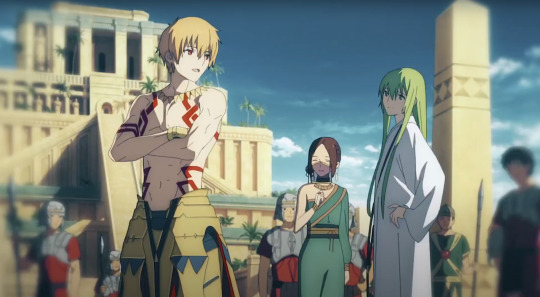
And with that, I’ve covered a fraction of The Epic of Gilgamesh. It took a lot of work and there’s a lot I couldn’t talk cover. I’ll probably make another post dedicated to Ea and another on Enkidu, but I’ll warn you, be prepared to cry.
psst... if you liked this essay, check out the full video essay on my youtube channel!
And I don't normally add this, but if I can be a teenie bit selfish on this one occasion:
Please check out the video (if you'd so graciously lend me a few minutes of your time) because it's by far the hardest I've ever worked on a video and I wholly believe the end result is really good. You can always leave a dislike and tell me how to improve if you don't like it lol
- love ya
youtube
#anime and manga#anime#gilgamesh#the epic of gilgamesh#fate series#fate grand order#fate stay night#fate strange fake#enkidu#Youtube
46 notes
·
View notes
Note
you run the Historicaly Queer pin kickstarter? It’s very cool, I like your selections, and I appreciate your explanations and nuance (and I also appreciate that you included asexual options). But I wanted to point out that Nanna (Sin) the Sumerian/Akkadian moon god and Inanna (Ishtar) the goddess of love and sex and war are two completely different gods. Inanna is usually depicted as Nanna’s daughter. Enheduanna what was a priestess of Nanna but she wrote hymns to many different gods, and her hymns to Inanna are now the most famous (partially because they’re comparatively very well preserved). This doesn’t detract from your main point, but the implication on the kickstarter that Nanna and Inanna are the same god was distracting!
Actually, there's no single answer on anything, and it depends on which sources you read, and from when, whether Nanna and Inanna are the same entity, whether Inanna is the daughter of Nanna and Ningal or the daughter of Enki or An, mother unknown. Whether she is even an Annuna or an Annunaki is disputed and changes. Her primary temple was the Eanna temple in Uruk, which was originally dedicated to An, and that further blurs her origins and stories, whether she was intended to be the same entity as An or Nanna changed into a different form (as happened with Lelwani, originally depicted as a god but who became a goddess when the Hittite religion was syncretized into the Akkadian religion after the Sumerian religion was swallowed by and incorporated into the Akkadian one).
"The Sumerian religion" covers a period of history spanning over two thousand years, and we only have firm records for about 600 or so of those years before the Sumerian religion was incorporated into the Akkadian one. Further, most of the writing that we have which covers the Sumerian religion at all comes from the Babylonians no earlier than the 17th century BC, from translations of Sumerian stories passed through Akkadian and into Babylonian some six hundred years after the effective end of "the Sumerian religion."
Stating anything singularly and definitively about these figures over the entire span of their worship is almost impossible, which is why we took the most fluid stance on identity possible.
I could probably go on about this for hours because I wrote the Annuna pantheon (I know, but we needed a single name, and 'Annuna and Annunaki' just doesn't roll off the tongue) in... two? three? books for Scion 2e, but I have to go make dinner.
But yeah, that's my pin project. :) Thanks for giving me the opportunity to ramble about the impossibility of making singular statements about these figures across the totality of their worship. I mean, just think about how much we don't get all of the references or understand everything about literature that's a hundred years old in our own language, and then imagine how impossible it is to make fully definitive statements about the identity/identities of blurred deities across at least three languages and 3000+ years!
21 notes
·
View notes
Text
20 questions for fic writers!
tagged by @chubsthehamster- thanks!
1. How many works do you have on ao3?
32, unless you count the book covers. I've got 106 book covers
2. What’s your total ao3 word count?
487,170
3. What fandoms do you write for?
Whatever I get stuck on at any given moment. My most recent ones are 9-1-1, Inception, ATS and Hawkeye, but my repeat fandoms are Spn, X-Men, The Old Guard and Black Sails.
4. What are your top five fics by kudos?
I'm copying chubs and doing my personal favorites, because my top four kudos'd fic are all for the same fandom (The Old Guard) and written within like three weeks of each other.
The Scroll of Saint Barnabas (9-1-1, Buddie, 15k): recency bias, but I had a lot of fun with this one. I also probably drove my girlfriend*and cousin insane during the writing process. Sorry about that. The basic premise is: we all know how time loop fics go, but what if after the loop is broken the character has PTSD from all the things that nobody else remembers? And also what if you get a knotted dildo hooked onto your permanent retainer? *though we've now established consent and parameters for whether we can have sex if one of us is stuck in a time loop. It's always important to have these conversations in advance!!!
What The Moon Was Saying (Spn, destiel, 16k.) It's about Dean rescuing Cas from the Empty, technically, but it's also about Dean working through things he refuses to think about directly, and it's also about the perspective of dead characters who aren't all-knowing and have no clue what happened after they died, and it's also about Inanna's Descent into the Underworld and how many jokes about Sumerian mythology I could fit in there that probably nobody else is going to think are funny but I think are funny, and it's also about what issues Orpheus would have had if he'd succeeded. The central thesis statement is that Margaritaville is thee Dean Winchester Mental State song.
The Mixtape, Or: Six Things You Learn in Thursday School (Spn, destiel, 6k.) I always had this idea that I was going to write a fantasy book of some kind, where the first part would be about the founding of a religion and then the following parts would jump ahead a few hundred years and see how that religion and that original story change in the telling. Instead of writing that book I wrote 6,000 words about a post-apocalyptic religion whose foundational text was the Winchester Gospels, except they don't actually have the Winchester Gospels, so they're relying on collected ephemera and thirdhand accounts. It is also about both academic and online discourse.
The House on Graymalkin Lane (X-Men, background cherik, 92k.) My nice little outsider-POV x-men haunted house fic. It started out as "the x-mansion would be a bonkers haunted house" and then it turned into a love letter to the original timeline (we barely knew ye). It's about the mortifying ordeal of being in high school and also about how all my grandparents died at once and I had a lot of complicated feelings about that.
The Ill-Made Knight (X-Men, cherik, 1.5k) OK so you know that trope that's like "if anyone is going to kill me I want it to be you"?? it's that, but instead of being used as a statement of everlasting love and devotion, it's being used as psychological warfare. And also kind of a statement of everlasting love. But in a fucked up sort of way. Because Cherik.
5. Do you respond to comments? Why or why not?
Yes! I didn't used to but I do now because I always like it when people reply to mine. Sometimes I miss them and respond years later but like... I got there eventually?
6. What is the fic you wrote with the angstiest ending?
the whole estate of mortal man. (Black Sails, silverflint, 40k.) Silver is immortal but has a very impermanent self. Flint is mortal and has a very permanent self. There was only one way that was ever going to end and I stand by it.
7. What’s the fic you wrote with the happiest ending?
Of recent ones, I guess The Most Fun A Girl Can Have? (Kate/Yelena, 8k.) They're having a pretty good time for most of it.
8. Do you get hate on fic?
Not since like, high school.
9. Do you write smut?
Nope. Hats off to smut writers, you're doing God's work. It's very difficult.
10. Do you write crossovers?
I haven't, unless you count every Marvel fic being a crossover. And Good Omens show/book. But that seems like a cop-out.
11. Have you ever had a fic stolen?
Not as far as I know.
12. Have you ever had a fic translated?
Yes! Some very kind people translated The Punishment of Sisyphus (Black Sails crackfic) and Antebellum (Black Sails, Anne & Eleanor fic) into Russian, Stalefish (Old Guard, Nile-centric) into Polish, and Kidnapping for Dummies (Old Guard, Joe shenanigans) into Spanish. I can only read the Spanish one.
13. Have you ever co-written a fic before?
Yessss. The #ImmortalHusbands Conspiracy (The Old Guard social media fic) with @phoenix-acid. That was very fun.
14. What’s your all-time favourite ship?
Why would you ask me this. This is cruel. I can barely pick a top 5.
15. What’s a WIP you want to finish but probably won’t?
The Marvel pirate AU, probably. It's almost a complete story on its own as it stands. There's about half a next chapter written and I could probably us that to tie things up, if I cut out a bunch of things, but I'd have to reread all my research. I did way too much research for that.
16. What are your writing strengths?
Character voices? I hope it's character voices. I watch a lot of youtube compilations before writing anyone to try and get a handle on how they talk.
17. What are your writing weaknesses?
The actual romance part of a romance. What do you mean they have to get together after I've set everything up so that they get together? Ridiculous.
18. Thoughts on writing dialogue in another language in fic?
I've never done it before, but I respect people who can pull it off. I do really hate that trope though where a multilingual character calls their love interest pet names in their mother-tongue, when they are never shown using it that way (or mixing that language and English in a conversation) in canon.
19. First fandom you wrote for?
....percy jackson and the olympians.
20. Favourite fic you’ve written?
Since I listed five favorites up there I'm switching this with the kudos question. Fic with the most kudos is Kidnapping for Dummies (The Old Guard, 3.5k)
Tagging @monstrous-femme @thegeminisage @bomberqueen17 @ellelans @annerbhp @significanceofmoths and anyone else who wants to do it. say i tagged you. nobody will ever check to find out.
14 notes
·
View notes